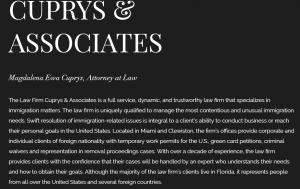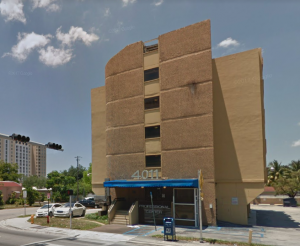Based on Supreme Court Case in Pereira v. Sessions, Immigration Attorney recommends affected persons seek legal advice
The Supreme Court announced Pereira v Sessions regarding the stop-time rule. Attorney Magdalena Cuprys recommends that affected persons seek legal advice.
Serving Immigrants, Inc. (N/A:N/A)
... the Supreme Court made the correct decision ... [but] ... if you have a Notice to Appear and it does not have the date and location of the hearing, you may want to speak with an attorney ...”
MIAMI, FLORIDA, UNITED STATES, June 28, 2018 /EINPresswire.com/ -- On June 21, 2018 the United States Supreme Court announced the decision in Pereira v Sessions regarding the stop-time rule. In simple terms, the “stop-time rule” defines when continuous residence or continuous physical presence of a non-citizen ends. See INA § 240A(d). According to INA § 240A(d), continuous residence ends when either the non-citizen commits a criminal offense, or is served with a “Notice to Appear” (“NTA”) placing him/her in removal (deportation) proceedings. See INA § 240A(d)(1)(A)-(B). In this important decision, the Supreme Court pondered whether the stop-time rule is triggered when the government serves a non-citizen with a document that is labeled “Notice to Appear” but fails to specify either the time or place of the removal proceedings.— Magdalena Cuprys, Immigration Lawyer
Pereira v. Sessions is about Wescley Fonseca Pereira, a Brazilian citizen, who overstayed his visa in the United States. The visa expired on December 21, 2000. In May 2006, Pereira was served with a Notice to Appear by the U.S. Department of Homeland Security (DHS). While the notice ordered Pereira to appear before an immigration judge, the problem with the order was that no specific time or place regarding the hearing was on the Notice. To further complicate matters, the immigration court mailed Pereira a notice that scheduled his hearing for October 31, 2007, but they failed to mail the notice to his designated post office box. Therefore Pereira never received the Notice. After Pereira failed to show up in court, the court ordered Pereira to be removed (deported).
The United States Supreme Court now decided in an 8-1 decision that no, if a non-citizen is not informed of when and where to appear for removal proceedings, this does not trigger the stop-time rule.
Based on this Supreme Court case, Immigration Attorney Magdalena Cuprys recommends that affected persons seek legal advice. “While we believe the Supreme Court made the correct decision and they delivered a common sense ruling of the law, the issue I want to stress is that if you have a Notice to Appear and it does not have the date and location of the hearing, you may want to speak with an attorney ASAP.” Ms. Cuprys adds that “you need to see if you qualify for termination or may be eligible for relief for which you were not previously eligible.”
The Supreme Court opinion is at https://www.supremecourt.gov/opinions/17pdf/17-459_1o13.pdf. -- Ms. Magdalena Cuprys is the principal attorney of Serving Immigrants, a full-service immigration law firm with over a decade of experience. See www.servingimmigrants.com. Ms. Cuprys received her Juris Doctor from the University of Washington School of Law in 2002 and has a blog where she writes about important immigration issues. You can find her blog at http://magdalenacuprysblog.blogspot.com/. Her profile is at https://solomonlawguild.com/magdalena-e-cuprys%2C-esq
Tiffany Ramirez
Cuprys and Associates, Serving Immigrants
305-924-1133
email us here
Video on Youtube about the case of Pereira v Sessions (provided by Breaking News 24/7).



